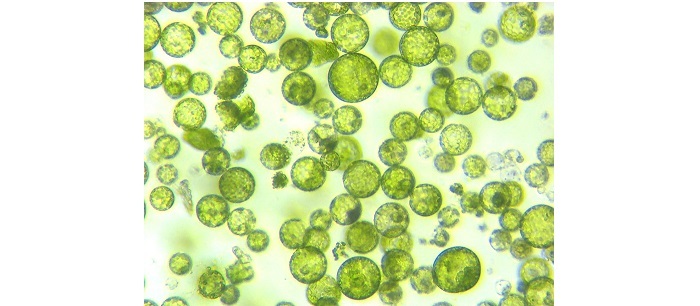
 Data Structure
Data Structure Networking
Networking RDBMS
RDBMS Operating System
Operating System Java
Java MS Excel
MS Excel iOS
iOS HTML
HTML CSS
CSS Android
Android Python
Python C Programming
C Programming C++
C++ C#
C# MongoDB
MongoDB MySQL
MySQL Javascript
Javascript PHP
PHP
- Selected Reading
- UPSC IAS Exams Notes
- Developer's Best Practices
- Questions and Answers
- Effective Resume Writing
- HR Interview Questions
- Computer Glossary
- Who is Who
Importance of Protoplast Culture in Plant Regeneration
Introduction
Protoplast culture is a laboratory technique that involves the isolation of the plant cell from the cell wall. The protoplasts can then be cultured in vitro, allowing for the study of cellular processes, including cell division, differentiation, and regeneration.

Protoplast
The technique has many applications in plant biotechnology, including the production of new crop varieties, genetic engineering, and the production of plant secondary metabolites. Below we shall look at the importance of protoplast culture in plant regeneration and how it is used to produce new plants.
What Are Protoplasts?
Protoplasts are cells that have had their cell walls removed, leaving behind only the plasma membrane, cytoplasm, and nucleus. The technique of protoplast isolation involves the use of enzymes, such as cellulases and pectinases, which break down the cell wall, allowing the protoplasts to be released.
Protoplasts can be isolated from a variety of plant tissues, including leaves, roots, and embryos. The cells can then be cultured in vitro, allowing them to divide and differentiate into new cells and tissues.
Importance of Protoplast Culture in Plant Regeneration
Protoplast culture has many applications in plant biotechnology, including the production of new crop varieties, genetic engineering, and the production of plant secondary metabolites. Here are some of the ways in which protoplast culture is important for plant regeneration ?
Production of New Plant Varieties
Protoplast culture is an important tool in the production of new plant varieties. By fusing protoplasts from different plant species, scientists can create hybrid plants with desirable characteristics, such as resistance to disease, increased yield, and improved quality.
This technique is known as protoplast fusion or somatic hybridization. Protoplast fusion has been used successfully in the production of new crop varieties, including tomatoes, potatoes, and citrus fruits.

Genetic Engineering
Protoplast culture is also used in genetic engineering, allowing scientists to introduce new genes into plant cells. The technique involves the use of a plasmid, which is a circular piece of DNA that contains the gene of interest. The plasmid is introduced into the protoplasts, which can then be cultured in vitro, allowing the new gene to be expressed.
This technique is known as protoplast transformation or genetic transformation. Genetic transformation has been used to produce plants with desirable traits, such as resistance to herbicides, insecticides, and disease.
Production of Plant Secondary Metabolites
Protoplast culture is also used in the production of plant secondary metabolites, which are compounds produced by plants that are not directly involved in growth or development but have important ecological roles, such as defense against herbivores and pathogens. The production of plant secondary metabolites is important for the pharmaceutical and food industries, as these compounds have many potential uses, including as antibiotics, anticancer agents, and flavorings. Protoplast culture can be used to produce large quantities of plant secondary metabolites in vitro, allowing for their purification and characterization.
Protoplast Culture Techniques
Protoplast culture involves the isolation of the plant cell from the cell wall, followed by the culture of the protoplasts in vitro.
Here are the steps involved in protoplast culture ?
Isolation of Protoplasts
Protoplast isolation involves the use of enzymes, such as cellulases and pectinases, which break down the cell wall, allowing the protoplasts to be released. The enzymes are usually mixed with a solution containing salts and sugars, which helps to maintain the osmotic balance of the protoplasts.

The plant tissue is then incubated in the enzyme solution for several hours, allowing the cell wall to be digested. Once the cell wall has been removed, the protoplasts can be washed and purified to remove any remaining debris or enzyme solution.
Culture of Protoplasts
Once the protoplasts have been isolated, they can be cultured in vitro. Protoplast culture requires a specific medium that contains all the necessary nutrients and growth factors required for cell growth and differentiation.
The medium also needs to maintain the osmotic balance of the protoplasts, as they are now without a cell wall. The medium is usually supplemented with hormones, such as auxins and cytokinins, which are important for cell division and differentiation.
Regeneration of Plants
Protoplasts can be induced to regenerate into whole plants under specific culture conditions. Regeneration can be achieved either through somatic embryogenesis, where the protoplasts differentiate into an embryo-like structure, or through organogenesis, where the protoplasts differentiate into shoot or root structures. Once the plants have regenerated, they can be transferred to soil and grown under normal conditions.
Challenges in Protoplast Culture
Protoplast culture is a complex and challenging technique that requires a lot of skill and expertise. There are many challenges that can arise during protoplast culture, including low protoplast yields, contamination, and difficulties in inducing plant regeneration. Here are some of the challenges that can arise during protoplast culture ?
-
Low Protoplast Yields: Protoplast isolation is a challenging process that requires the use of enzymes to break down the cell wall. However, not all plant tissues are amenable to protoplast isolation, and some tissues may require more aggressive enzymatic treatments, which can damage the protoplasts.
Low protoplast yields can also be due to variations in the enzymatic treatment, such as the concentration of enzymes, the duration of incubation, and the temperature.
Contamination: Protoplast culture is susceptible to contamination by bacteria, fungi, and other microorganisms. Contamination can occur during the protoplast isolation process or during the culture of the protoplasts. Contamination can have a significant impact on the viability of the protoplasts and can lead to the failure of the culture.
Difficulties in Inducing Plant Regeneration
Inducing plant regeneration from protoplasts can be a challenging process. The conditions required for regeneration are complex and vary depending on the plant species and tissue type. The success of plant regeneration can be influenced by factors such as the age and quality of the donor tissue, the type and concentration of hormones in the culture medium, and the light and temperature conditions.
Conclusion
Protoplast culture is a powerful tool in plant biotechnology that allows for the study of cellular processes, including cell division, differentiation, and regeneration. Protoplast culture has many applications in plant biotechnology, including the production of new crop varieties, genetic engineering, and the production of Soma clones.

